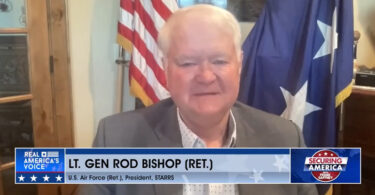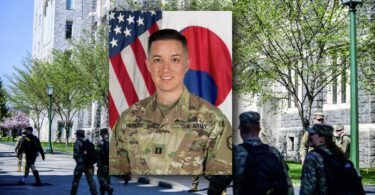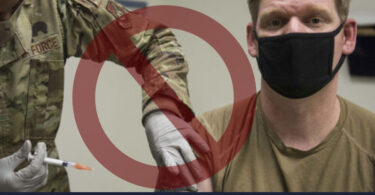By Dan Chalk | Midland Daily News
In the view of retired U.S. Army Captain Michael Miller of Midland, the late Gen. Douglas MacArthur’s words “Duty, Honor, Country” helped him and the soldiers he commanded survive a particularly harrowing night in Vietnam in 1968.
For that reason and others, Miller wants those words to remain as part of the mission statement of the United States Military Academy, of which he is a 1964 graduate.
Miller sent a letter on March 15 to Lieutenant General Steven Gilland, superintendent of the U.S. Military Academy, commonly known as West Point, expressing his strong opposition to a recent change in the academy’s mission statement.
Miller was present for MacArthur’s 1962 speech at West Point which included the now-famous words, “Duty, Honor, Country.”. . .
In his letter to Gilland, in which he identified himself as a West Point graduate and a Legion of Merit awardee, Miller wrote in part,
“Please do not harm West Point’s commitment to the simple motto “Duty, Honor, Country.” We set the values for the army and the country. We should never forget that.”
Pertaining to one particular night in Vietnam in 1968 during the Tet Offensive, when U.S. troops and their South Vietnamese allies suffered heavy losses, Miller wrote that those three words sustained him and the soldiers under his command.
“My 60 soldiers were surrounded at night by a 5,000 man (North Vietnamese Army) regiment. The situation looked hopeless. I was under tremendous pressure. Survival was not possible,” Miller wrote.
“I clearly remember focusing on MacArthur’s words to the Corps: “Duty, Honor, Country.” And that is what I did. I forgot everything else, and I focused on doing my duty with honor for my country,” Miller continued.
“Through an extraordinary series of events, we survived that night. After-action reporters indicated that my actions and conduct had inspired my men and they dutifully followed my example. Thus we survived.
“That night, in the darkness of night in the Mekong Delta, my men and I were forged into a tribe of men who would die for each other, reaching levels of comradeship and love that few people get to experience.
“All of this because of my devotion to Duty, Honor, Country.”
Miller later learned that the regiment that had surrounded his company had been reassigned to Saigon.
“We passed the whole night waiting for the attack. In the morning they were gone,” he told the Daily News.
As of April 9, Miller said West Point had not replied to his letter. “Which surprised me, because they have a big staff of people that do that,” he said.
While “Duty, Honor, Country” was not added to West Point’s mission statement until 1998, Miller said those words were a central focus during his time at the academy in the early 1960s.
“‘Duty, Honor, Country’ was crammed into me,” he said. “It was engraved in statues; it was over doorways in the concrete.”
Miller said this was the first time he has voiced opposition to a change at West Point. He said opening the academy to women in 1976, for example, was a change for the better. But he felt the need to speak up about the change in the mission statement.
“When the new superintendent changed the motto, I reacted like everyone else did,” he said. “All he has to do is make a short statement, (such as): ‘I did not mean to disrupt the traditions at West Point. But he hasn’t done that. So there’s politics involved. He’s been told (what to do) by the powers that be that are not real keen on a strong military.
“My purpose in writing was a protest that some things need to stay the same,” Miller added.








Leave a Comment